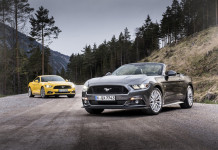Germany has ensured that Opel’s tens of thousands of workers will still have a job on Monday when its once-mighty US parent General Motors, as is expected, makes history and files for bankruptcy.
But Chancellor Angela Merkel’s decision to support with taxpayers’ money a Kremlin-backed rescue may come back to haunt her, and could fail to prevent Opel crashing and burning further down the road, experts say.
“All this seems to rest on a very fragile base. Let’s say there is a 60 or 70 percent chance that it won’t work,” Juergen Pieper, an automotive analyst at Metzler Bank, told AFP.
In a mammoth effort over recent months climaxing in a frenzy of activity last week, the German government agreed in the early hours of Saturday morning to back a takeover of Opel by a consortium formed around Canada’s Magna.
Under the deal, GM would keep 35 percent of the company and Opel’s workers would retain 10 percent. Magna, which makes auto parts, would hold a 20 percent stake and state-owned Russian lender Sberbank 35 percent.
Government sources told AFP that Germany would act as guarantor for around three billion euros (4.2 billion dollars) worth of loans, and the government would also itself make an emergency loan of 1.5 billion euros to Opel.
Magna meanwhile, which until recently was relatively unknown outside the auto industry, has pledged to cough up 300 million euros to keep the cash-starved Opel alive in the coming weeks.
The Canadian firm, which thrashed out an eleventh-hour agreement with GM executives in a luxury Berlin hotel on Friday, has pledged to keep all Opel’s German factories open and limit job cuts there to around 2,500.
But across Europe as a whole, where GM employs some 50,000 people including 7,000 in Spain and 4,700 at Britain’s Vauxhall, the picture may be less rosy with Magna saying it plans to lay off one in five workers.
Last week Germany came under pressure from Britain and Belgium not to save German jobs at the expense of workers elsewhere, and on Saturday Britain’s biggest trade union Unite voiced concern about the fate of Vauxhall workers.
It was also unclear whether Magna’s intention to start making Opel cars at a factory in Russia owned by precious metals tycoon Oleg Deripaska’s GAZ automaker would mean some production will be taken away from plants in the European Union.
Russian involvement also raises eyebrows because it strengthens the already strong business ties — most notably in gas — between Berlin and Moscow. Critics say that these ties make Germany too soft on the Kremlin.
For analysts, it was September’s elections in Germany that helped win Merkel over to Russian involvement.
“Money doesn’t smell at election time,” said Andrew Wilson at the European Council of Foreign Relations think tank.
Magna and its Russian backers have their work cut out making the deal work, with Opel part of a global automotive industry that was already facing huge challenges even before the world economy hit the skids last year.
Frank Schwope, an analyst at Germany’s NordLB bank, predicted that the Canadian-Russian investors “will try everything, and then fail and Opel will be insolvent in two or three years.”
Magna also has very little experience making cars — unlike Fiat, which also wanted to snap up Opel but then got cold feet — and the financial details of the deal are unclear.
Merkel admitted on Saturday that the road ahead is a rocky one.
“For Opel and Magna, the work is now just beginning and there are several difficulties still to overcome,” she said.
But cynics say that for the chancellor and her partners in the governing coalition, even if Opel does end up collapsing further down the road, it is mission accomplished: Opel will not be issue in September’s vote.








